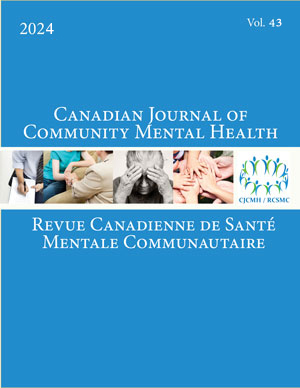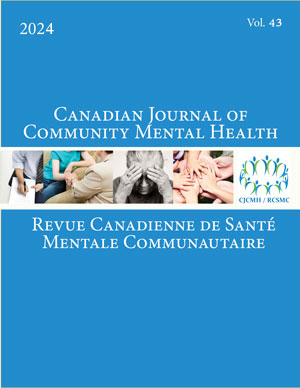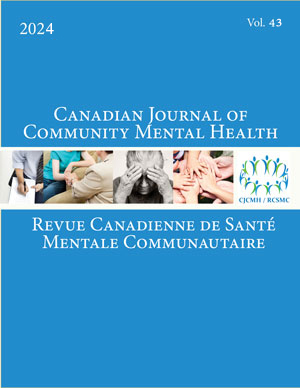Volume 39 • Number 1 • May 2020
Articles
OPEN ACCESS
Post-secondary students have been identified as an at-risk population for chronic stress and poor mental health. We conducted a scoping review of the academic literature surrounding student stress and mental well-being as the first phase of research in the development of Canada’s National Standard for the Psychological Health and Safety of Post-Secondary Students. Major thematic findings included student stress, resilience through effective coping and help-seeking, and programs or strategies to improve campus mental health. Recommendations include a call for increased mental health promotion and mental illness prevention activities that are sensitive to diverse cultures, ethnicities, religions, and sexualities.
OPEN ACCESS
Youth mental health is a major public health concern. This study assesses whether baseline and short-term changes in mental health predict anxiety and depressive symptoms in college students. Not flourishing mental health at baseline was a risk factor for high levels of anxiety and depressive symptoms. Compared to participants with stable flourishing mental health, those who declined to not flourishing and those who were stable not flourishing had increased risks of high anxiety and depressive symptoms. Assessing mental health may be effective in predicting mental disorder symptoms and supports the need for mental health promotion interventions.
OPEN ACCESS
Cette recherche qualitative explore les points de vue de mères, de pères et d’adolescents (n = 43) quant aux services reçus pour les problèmes cooccurrents de violence conjugale, de santé mentale et de consommation chez les parents. Les données ont été recueillies par des entrevues semi-dirigées, soutenues d’un outil de cartographie des services utilisés. L’analyse de contenu thématique montre que les participants déploient plusieurs stratégies pour faire face aux problèmes cooccurrents vécus et utilisent diverses ressources d’aide formelle et informelle. Plusieurs recommandations sont proposées pour améliorer l’offre d’aide aux familles en situation de cooccurrence, dont la concertation entre les différentes ressources concernées.
OPEN ACCESS
Transition Space at the Museum is a community arts-based group program aiming to foster the psychosocial rehabilitation of adolescents and young adults with mental health problems. In this pilot evaluation, we assessed the preliminary effectiveness of the program at improving participants’ well-being and social functioning. Following a mixed-methods, single-group, repeated-measures design, we collected data before, during, and after program from participants, clinicians, and close relatives using standardized questionnaires and semi-structured interviews. We found converging quantitative and qualitative results supporting the safety and potential of the program to improve the way participants feel and function socially in the short term.
OPEN ACCESS
Community mental health programs have garnered significant attention during the last decade. In this paper we ask to what extent these programs impact the capacity of service users to move around in the city space. Drawing on case studies from ethnographic research conducted in Campinas (Brazil) and Montréal (Canada), which included semi-structured interviews with a total of 16 service users and 49 mental health professionals, we explore the significance of urban mobility as part of service users’ mental health recovery and service providers’ practice. Findings suggest that service providers play a key role in facilitating meaningful mobility in the city space.
OPEN ACCESS
Farmers face multiple stressors and are becoming alert to mental health, yet their views are underresearched. We conducted, recorded, and thematically analyzed 16 semi-structured interviews with Ontario small-holder farmers recruited through county farm organizations. A subset mapped stress effects on their health. Farmers believed their health was fundamental to their farms’ viability and they approached challenges to their health and mental health similarly to how they would approach challenges to their farm. Health was a balancing act amidst stressors; good stress challenging them, and bad stress occasionally overwhelming them. Poor mental health was a barrier, while good mental health was essential for resilience. Multiple opportunities exist to work with farmers, farm organizations, and their rural communities to better support farmers striving for balance and resilience in their mental health.
OPEN ACCESS
Participation in community-based leisure activity can be beneficial for supporting recovery for people with mental illness, but many barriers are faced. Drawing on first-voice perspectives, this study examined personal, social, and organizational factors that facilitate community-based leisure participation and suggests practical ways to create leisure environments that they would find supportive and more accessible. Five focus groups were conducted with adults in urban and rural communities in Nova Scotia. Through thematic analysis, five types of facilitators were identified: self-management and self-care; finding meaning; active social supports and connections; welcoming environments; and, educating others. Implications for practice are presented.
Practice Innovations
OPEN ACCESS
We present the findings from a one-day, multidisciplinary meeting to gather feedback for an integrated knowledge translation research project addressing the integration of health services and supports for individuals with traumatic brain injury, mental health, and/or addictions; especially those who experience homelessness/vulnerably housed, intersect with the criminal justice system, and are survivors of intimate partner violence. This meeting brought together persons with lived experience, service providers, decision makers, and researchers, who provided feedback that further refined the research methodology and highlighted existing gaps. This event was successful in inviting collaboration, knowledge exchange and dissemination, and advancing an important knowledge-to-action cycle for this research.










